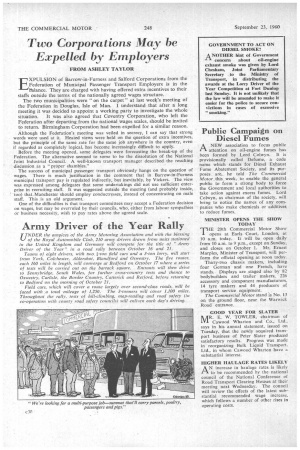Two Corporations May be Expelled by Employers
Page 96

If you've noticed an error in this article please click here to report it so we can fix it.
FROM ASHLEY TAYLOR EXPULSION of Barrow-in-Furness and Salford Corporations from the Federation of Municipal Passenger Transport Employers is in the litlance. They are charged with having offered extra incentives to their staffs outside the terms of the nationally agreed wages structure.
The two municipalities were " on the carpet" at last week's meeting of the Federation in Douglas, Isle of Man. I understand that after a long meeting it was decided to appoint a working party to investigate the whole situation. It was also agreed that Coventry Corporation, who left the Federation after departing from the national wages scales, should be invited to return. Birmingham Corporation had been expelled for a similar reason.
Although the Fedetation's meeting was veiled in secrecy, I can say that strong words were used at it Heated views were held on the question of extra incentives, but the principle of the same rate for the same job anywhere in the country, even if regarded as completely logical, has become increasingly difficult to apply.
Before the meeting opened, some delegates were forecasting the break-up of the Federation. The alternative seemed to some to he the dissolution of the National Joint Industrial Council. A well-known transport manager described the resulting discussion as a "proper shambles."
The success of municipal passenger transport obviously hangs on the question of wages. There is much justification in the comment that in Barrow-in-Furness municipal transport pay is regulated indirectly, but inevitably, by Vickers. The view was expressed among delegates that some undertakings did not use sufficient enterprise in recruiting staff. It was suggested outside the meeting (and probably inside, too) that Manchester should employ conductresses, instead of concentrating on male staff. This is an old argument.
One of the difficulties is that transport committees may accept a Federation decision on wages, but may be overruled by their councils, who, either from labour sympathies or business necessity, wish to pay rates above the agreed scale.




































































































































































































































































































































































